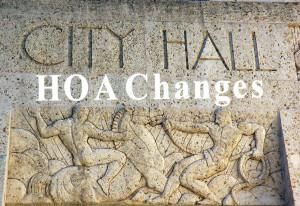An estimated 4.8 million Texans live in neighborhoods with homeowners associations (HOAs). That means that nearly 20% of all Texans’ property rights may be affected by rules set by entities that have been largely unregulated … until now.Last session, the Texas Legislature passed several bills designed to better balance the interests of property owners and HOAs. These laws change how homeowners associations are governed, what HORs can and cannot do regarding penalties and foreclosures, and provide more rights to property owners regarding use of their property.
Here are summaries of some changes now in effect.
Elections, meetings, and directors
Open Board meetings. Generally, board meetings must be open to owners, subject to the right of the board to adjourn and reconvene in a closed executive session to consider certain statutorily defined issues (which then must be summarized orally and placed in the minutes).
Board meeting minutes. HOA boards must, keep written minutes as a record of each regular and special meeting and give owners access to those approved minutes.
Meeting notice. Boards must give owners notice of upcoming meetings, including the date, hour, place, and general subject matter of issues to be discussed, as well as those to be discussed in executive session.
Amount of notice. If notice of a meeting is mailed, it must be given at least 10 days but no more than 60 days in advance. If notice is being conspicuously posted (i.e., placed in a common area or on a website) and being emailed to all owners, at least 72 hours advance notice is allowed.
No secret ballots. Secret ballots are prohibited. Any vote cast in an election or vote by an owner must be in writing and signed by the owner, unless it is an uncontested election or electronic ballot.
Recount procedures. HOAs must conduct a recount of an election vote if a recount is requested by an owner within 15 days after the election. The recount must be performed by a person qualified to tabulate votes.
Director qualifications. All owners may run for the HOA board. Any rule that restricts such a right is void, unless the board receives governmental evidence that a director has been convicted of certain crimes, in which case the director is automatically removed and ineligible to serve again.
Electronic and absentee ballots. Electronic and absentee ballots are valid.
Director Appointment. When a director’s term expires, he must stand for re-election. Vacancies may be filled by appointment, but only for the remainder of the term, and then directors must he elected.
Election vote tabulators. Only election vote tabulators are allowed access to ballots. This would include people such as current or former judges or an individual agreed on by both parties who is not also an owner or related to an owner.
Annual meetings and elections. HOAs must hold annual meetings. If they fail to do so, owners may demand such a meeting. If this is unsuccessful, owners may call an election meeting.
Records and Documents
Recording requirements. A governing document (e.g., bylaws and rules) will not be effective unless it is recorded with the county. This means that if the HOA fails to record bylaws, for instance, they cannot be enforced against an owner (applies to condos as well).
Website Posting. A homeowners association’s governing documents must be posted on its publicly accessible website, if there is one.
Declaration amendment. Declarations can only be amended by a vote of 67% of the owners, unless stated differently in the declaration itself.
Open record. HOA’s must make the books and records of the association open to an owner. This must include a procedure for requesting, producing, and charging for records, as well as a plan for records retention.
Record retention. HOAs with more than 14 lots must adopt a records-retention policy that consists of the following categories and retention periods:
• Financial records, minutes, and tax returns and audits must be retained for seven years, identifying each category respectively.
• Account records of current owners must be kept for five years.
• A contract for terms of at least one year or more must be retained for four years after the expiration of the contract.
Things HOAs can no longer prevent owners from:
- Install a solar energy device on the property, but this right can be limited.
- Install and use rain-harvesting devices, subject to certain aesthetic and architectural requirements.
- Display certain religious items on the entry of the property, subject to the association’s right to place some parameters on displays.
- Install roof shingles that are wind and/or hail resistant, energy efficient, or solar generating, if the quality and appearance are comparable to the subdivision standards.
- Fly the US, Texas or a branch of the U.S. armed forces flag, but the HOA may regulate the size, number, or location of flagpoles.
Call Bill Edge at 713-240-2949 to see Houston Homes in 24 hours or less.
Source: Texas Realtor Magazine, May 2012
